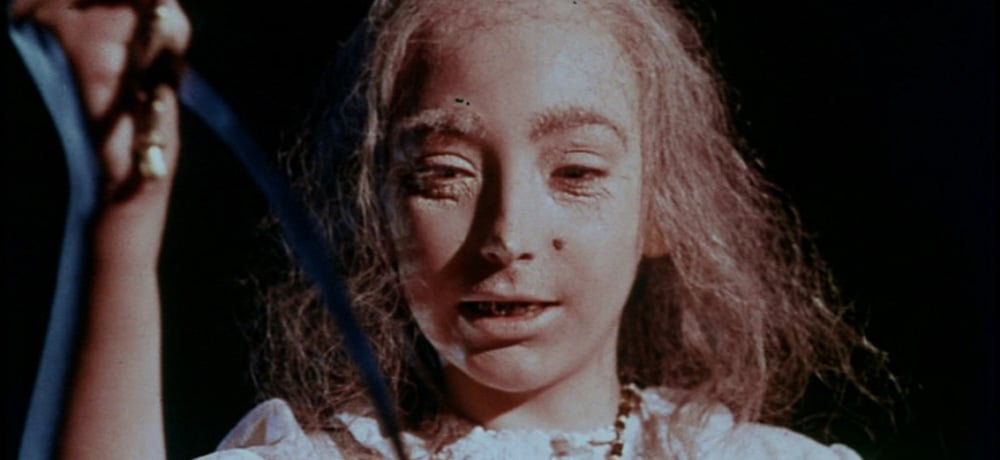


Here’s a title for you: Demon Witch Child (1975). This is the kind of title that conjures up images of crucifixes, and vomit, and crises of faith; a title that demands you confront your own relationship with the spiritual and contextualize your role in existence.
This is not that film.
Released in March in its native Spain, Demon Witch Child (a Rob Zombie song title if I’ve ever heard one) didn’t haunt Stateside drive-ins until May of the following year. Pay no heed to the critics, who immediately dismissed this as another The Exorcist rip off; instead, Demon Witch Child (aka La endemoniada and The Possessed) picks some of the strangest angles to come at that revered material from - so much so that it ends up doing its own thing in peculiar and fun ways.
An elderly and disheveled woman, Mother Gautère (Tota Alba - Strange Voyage), stumbles into an empty church and proceeds to desecrate the altar before stealing a chalice. Police Commissioner Barnes (Angel del Pozo - Horror Express) is visited by Father Juan (Julian Mateos - Four Rode Out) to discuss the theft; we’re introduced to Barnes’ daughter Susan (Marián Salgado - Island of the Damned) and her governess Anne (Lone Fleming - The Fourth Victim) before Barnes vows to catch the thief - and follow through on the tip that Mother Gautère may be responsible for the theft and a recently missing baby. (The only “tip” is that Mother is a Gypsy.)
Racial profiling aside, Mother Gautère is taken into custody and admits to both crimes, but won’t say where the baby is kept; under threat of sodium pentathol, she hurls herself through the precinct window to her death. At the same time, Susan is given a necklace and amulet by a minion of Gautère’s; when the old hag perishes, we see her spirit enter Susan’s body as she lay sleeping. And in a nod (or appropriation, to-may-to, to-mah-to) to Miss Blair, a bedtime levitation.
It doesn’t end there though; Susan develops a talent for profanity and a proclivity to take on the appearance of Gautère when the really bad shit is about to go down. Can Father Juan rescue Susan from destruction and conquer Gautère, or will she be doomed just by being in a ‘70s horror film?
While not terribly graphic, Demon Witch Child revels in that good old ‘70s narrative nihilism; if you don’t require your babies alive, your testicles intact nor a rainbow-hewed coda of peace, you’ve come to the right place. There’s a meanness at play, countered only by some earnest runs at compassion and empathy, and a priest resolute in his beliefs.
Father Juan’s Merrin Moments are given life as flashbacks before he joins the seminary; no mommy issues, but rather a young lady who is heartbroken by his decision to leave the secular world and her behind. These flashbacks are triggered by her reappearance as a disheveled sex worker, holding Juan responsible for how her life turned out. Does this add to Juan’s journey in rescuing Susan? Not in the least, and feels completely out of place with all the other action. It’s not a mistake on the part of writer/director Amando de Ossorio (the Blind Dead series of films) to try and give Juan some emotional weight, but it’s already there in his deeds and ends up feeling superfluous.
The other connection to the Friedkin classic is a discourse on science versus service, done in much the same way; a distraught father searching for answers while doctors lean towards an illness of the mind as opposed to one of the soul. De Ossorio leaves no room for ambiguity, or simply opts for the tactile in a genre suited for it; a limited budget leaves little for effects beyond time lapse photography and the simplest of in camera gags - in that, it certainly compares unfavorably to the gang at Warner Brothers.
Now, when it takes its own path Demon Witch Child (dig through ditches, etc.) doesn’t resemble The Exorcist at all as much as a straight up possession film, Killer Kids division; Susan teases and taunts - not from the confines of her bedroom, but rather as an insidious conduit for Gautère. (Not that she’s particularly warm when not possessed; Salgado’s detached performance sees to that.) Not confining Susan allows the film to stray further from the magic box office recipe; able to disguise her voice, she traps her victims to protect the sanctity of the final sacrifice - and believe me, she’ll do anything for Beelzebub.
The film doesn’t have the means to tackle the theological on a grand scale, wisely sticking to a more intimate attack, where a devil child choke can stand for (has to, really) the temporary triumph of Evil. And that intimacy allows for subtler displays of emotion; it doesn’t necessarily achieve them (hard to create a low vibe with potentially high camp material), but it allows for it.
Perhaps with Demon Witch Child, de Ossorio wanted to make a statement regarding the seduction of the innocent, or maybe he was just trying to cash in on a sure thing. Either way (and maybe both), the end result is a game of Telephone: one receiver hears “The Exorcist”, and 90 minutes later the other hears “Little girl in a bald wig castrates man on a tombstone”. To its credit, the gap doesn’t seem that huge; sacrifice is sacrifice. The difference is one is willing to offer light amongst the darkness, and the other almost no one has seen; but make no mistake, they both deserve to exist.
Demon Witch Child is available on DVD from Sinister Cinema.
Next: Drive-In Dust Offs: THE BRAIN (1988)